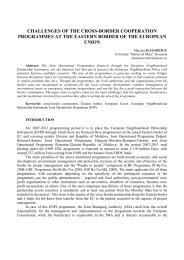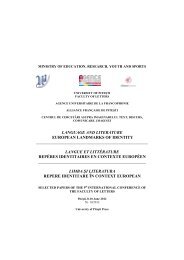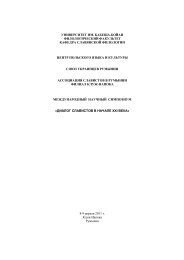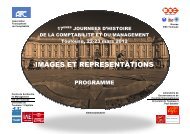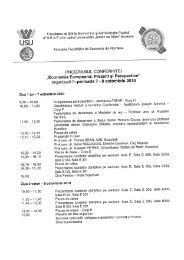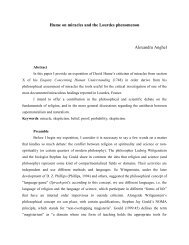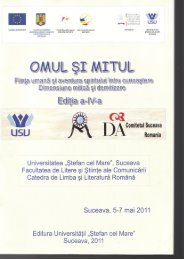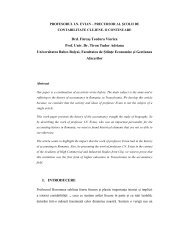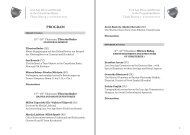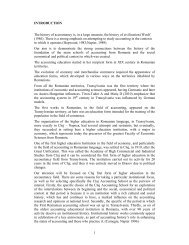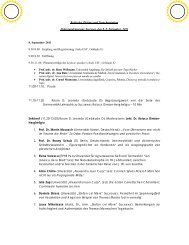La traduction caduque, retraduction et contexte culturel (en ...
La traduction caduque, retraduction et contexte culturel (en ...
La traduction caduque, retraduction et contexte culturel (en ...
You also want an ePaper? Increase the reach of your titles
YUMPU automatically turns print PDFs into web optimized ePapers that Google loves.
Lilia BELTAÏEF 1<br />
LA RETRADUCTION, OU<br />
LE LANGAGE REMIS À JOUR<br />
Abstract: B<strong>et</strong>we<strong>en</strong> the requirem<strong>en</strong>t of loyalty to the original and the research<br />
for the beauty in the text translates, the compromise is not easy to find. That to<br />
say th<strong>en</strong> about a new translation? It’s not certain the rep<strong>et</strong>ition swallowed of<br />
another translation. Time changes and the language also changes. Words,<br />
values, images and things disappear and the others appear. A new translation is<br />
oft<strong>en</strong> a necessity to update a verbal creation which marked the spirits for a<br />
while and which risks to sink into dungeon, because it is not anymore up to<br />
date, linguistically speaking, ideologically, culturally, <strong>et</strong>c. What we propose,<br />
through this article, is to work on translations of the same text, in this<br />
particular case a tale. Our objective will be to see what the factors which<br />
justify a new translation are and what is the impact of this operation on the<br />
literary work chos<strong>en</strong>.<br />
Keywords: translate, re-translate, new version, verbal language, necessity,<br />
update.<br />
Traduire, c’est trahir, c<strong>et</strong>te idée, ressassée depuis des lustres,<br />
persistera tant que la <strong>traduction</strong> restera liée à l’exig<strong>en</strong>ce de fidélité. Mais<br />
<strong>en</strong>core faut-il savoir de quelle fidélité il s’agit : linguistique, stylistique,<br />
intellectuelle, <strong>et</strong>c ? Autant de questions qui pourrai<strong>en</strong>t traumatiser toute<br />
personne éprouvant l’<strong>en</strong>vie de partager un plaisir de lecture avec les<br />
autres.<br />
Que dire alors d’une re-<strong>traduction</strong> ? Si la première est souv<strong>en</strong>t<br />
controversée, que dire de la seconde, de la troisième, de la quatrième <strong>et</strong><br />
ainsi de suite ? Une trahison sans fin ? Une chose est sûre, au moins,<br />
c’est qu’une re-<strong>traduction</strong> n’est <strong>et</strong> ne doit certainem<strong>en</strong>t pas être la<br />
répétition ravalée d’une anci<strong>en</strong>ne <strong>traduction</strong>. Sinon que dire de la<br />
pertin<strong>en</strong>ce du discours, exig<strong>en</strong>ce tant recommandée depuis Sperber <strong>et</strong><br />
Wilson ?<br />
Les suj<strong>et</strong>s parlants chang<strong>en</strong>t <strong>et</strong> la langue aussi. Des mots, des<br />
valeurs, des images <strong>et</strong> des conceptions disparaiss<strong>en</strong>t <strong>et</strong> d’autres<br />
1 Institut Supérieur des <strong>La</strong>ngues de Tunis -Université de Carthage<br />
liliabeltaief@yahoo.fr<br />
49



